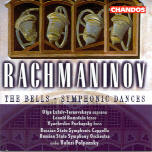Rachmaninov’s masterpieces all deal with death and a deep, desperate melancholy. In the Symphonic Dances, this morbid obsession is expressed through mechanical, hallucinatory joy, lascivious sonorities, and sudden outbursts of panic and terror, notably in the Dies Irae allusions of the last Dance. None of these elements can be found in Valeri Polyansky’s bland and dull reading. Too concerned with getting nice sounds and polished playing from his orchestra, he ends up with a performance that lacks rhythmic tension, a sense of fate, or biting savagery. Compared with Svetlanov’s devastating violence and extreme dynamic contrasts (Canyon), Polyansky’s civilized performance sounds clean, gentle, and limp. Similarly, The Bells receives a smiling, under-characterized treatment. Although beautifully sung, the choral parts offer sweet and soft sounds instead of white-hot intensity and granitic sonority, while the solo voices have a questionable tendency to emphasize the expression in an operatic style not really suited to the music. The panoramic and comfortable recording is the best part of this CD.
































